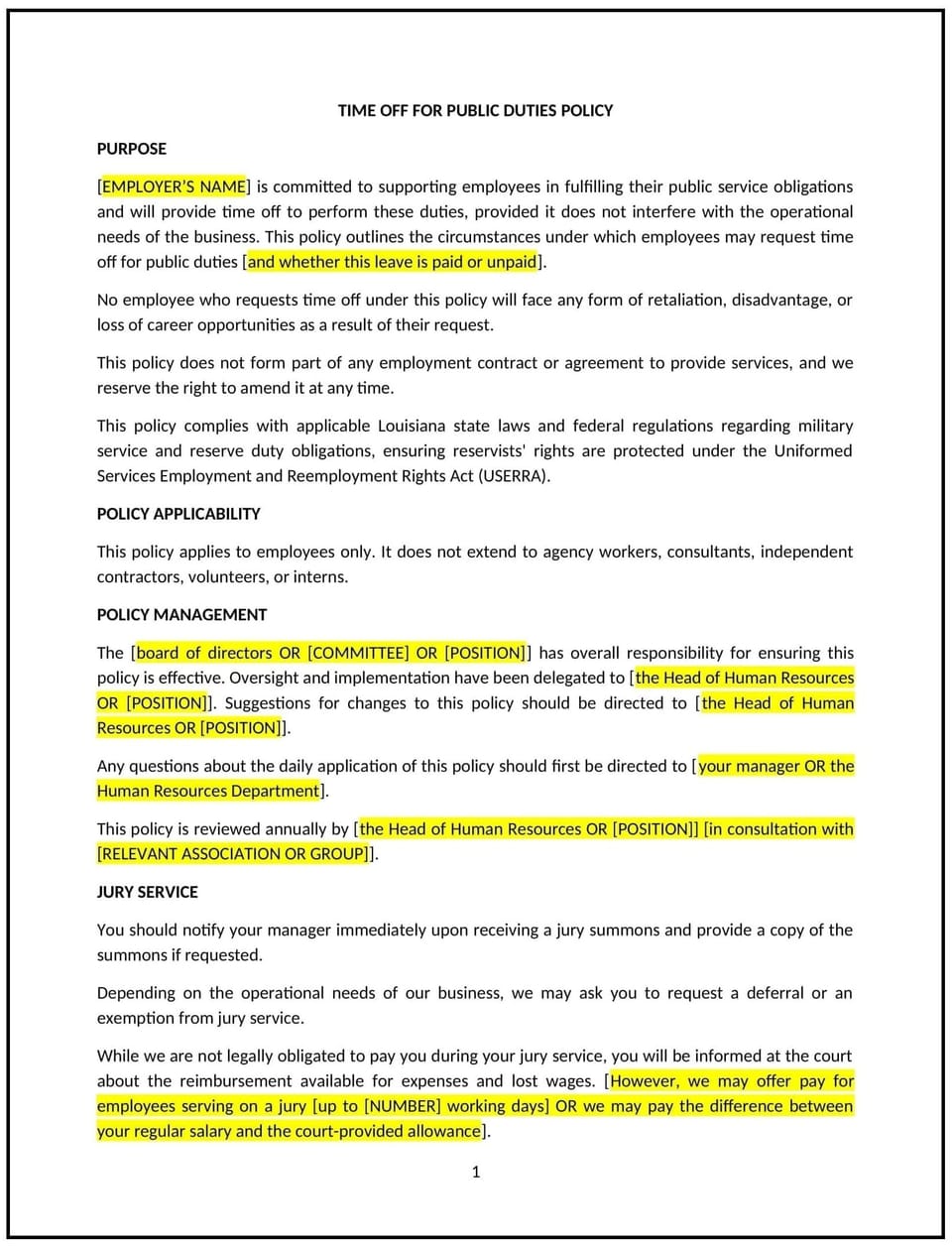Time off for public duties policy (Louisiana): Free template

Time off for public duties policy (Louisiana)
This time off for public duties policy is designed to help Louisiana businesses provide employees with clear guidelines for requesting and managing time off to fulfill public service responsibilities. It outlines eligibility, procedures, and expectations to support civic engagement while maintaining workplace productivity.
By implementing this policy, businesses can encourage public participation and demonstrate support for employees’ contributions to their communities.
How to use this time off for public duties policy (Louisiana)
- Define public duties: Specify the types of responsibilities covered, such as serving on a jury, attending court as a witness, participating in local government, or fulfilling military service obligations.
- Outline eligibility: Clarify which employees are eligible for time off under this policy, such as full-time, part-time, or temporary workers.
- Provide leave request procedures: Detail how employees should apply for time off, including advance notice and required documentation, such as summonses or official letters.
- Address pay and benefits: Specify whether time off for public duties is paid or unpaid and how benefits will be maintained during the leave period.
- Communicate return-to-work expectations: Explain the process for employees to resume work after completing their public duties.
- Include accommodations: Offer options for flexible scheduling or adjusted workloads to support employees balancing work and public responsibilities.
Benefits of using a time off for public duties policy (Louisiana)
Implementing this policy provides several advantages for Louisiana businesses:
- Encourages civic engagement: Supports employees in fulfilling public service obligations.
- Reduces disruptions: Establishes clear processes for managing absences related to public duties.
- Promotes fairness: Applies consistent standards for granting time off across the organization.
- Enhances morale: Demonstrates respect for employees’ community contributions.
- Reflects Louisiana-specific considerations: Adapts to regional norms and public service requirements.
Tips for using this time off for public duties policy (Louisiana)
- Communicate clearly: Share the policy during onboarding and provide reminders when relevant situations arise.
- Maintain documentation: Keep records of all leave requests and related correspondence for transparency and future reference.
- Plan for coverage: Develop strategies to manage workloads during employee absences, such as cross-training or temporary assignments.
- Provide flexibility: Work with employees to accommodate scheduling needs related to public duties.
- Update regularly: Revise the policy as needed to reflect changes in workplace practices or Louisiana-specific public service obligations.
Q: What types of public duties are covered under this policy?
A: Covered duties may include jury service, acting as a court witness, serving in local government roles, or fulfilling military obligations.
Q: Who is eligible to request time off for public duties?
A: Eligibility typically extends to all employees, including full-time, part-time, and temporary workers, as outlined in the policy.
Q: Is time off for public duties paid or unpaid?
A: Whether time off is paid or unpaid depends on the business’s policy and the specific type of public duty.
Q: What documentation is required to request time off?
A: Employees should provide official documentation, such as a jury summons, court notice, or letter confirming their public service role.
Q: What happens if an employee’s public duties require extended time away from work?
A: Extended absences should be discussed with HR or management, and accommodations may include temporary adjustments to workload or additional unpaid leave.
Q: How should employees notify their employer about public duties?
A: Employees should notify their manager or HR as soon as possible, following the procedures outlined in the policy, and provide required documentation.
Q: How often should this policy be reviewed?
A: The policy should be reviewed annually or when workplace practices or Louisiana-specific considerations evolve.
This article contains general legal information and does not contain legal advice. Cobrief is not a law firm or a substitute for an attorney or law firm. The law is complex and changes often. For legal advice, please ask a lawyer.


